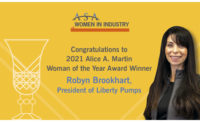Women in industry: Creating a culture of caring
What does a “culture of caring” mean?

It means if you have a culture of caring, you have an environment where people feel valued, and value others, displaying kindness and concern every day, in every interaction, in every way.
Companies that have been able to create a culture of caring may be rare, but we have several in our industry — including ASA members Eastern Industrial Supplies and The Granite Group.

Meagan Owen:
Culture seems to be all the rage in the corporate world today, or maybe that’s just because I read a lot about it, and because we really focus on it being real. At Eastern, we have a healthy desire to have a positive impact on the lives of people we come in contact with. One of the ways we foster this is through our 28 Fundamentals, or as we call it, The Eastern Way.
Each week we go over a fundamental and really focus on it by discussing it at the beginning of each meeting, in emails, and occasionally as a soft jab to our fellow associates when we catch each other in areas where there is room for improvement.
For example, are there times when you blame shift? I know I do. Actually, I must model that behavior pretty well because I constantly see it in my kids and have to remind them often that we should accept responsibility instead of pointing the finger in another direction.
Our 18th fundamental is to, “Practice Blameless Problem-Solving: Demonstrate a relentless solution focus rather than pointing fingers or dwelling on problems. Take 100% responsibility and make zero excuses. Identify lessons learned and use those lessons to improve ourselves and our processes so that we don’t make the same mistake twice. Get smarter with every mistake.”
These fundamentals help us to put our desired behaviors into words that help us proactively practice because we are seeing them and hearing them on a ritualistic basis.
We recently focused on our 28th fundamental, which is to “Keep Things Fun: While our passion for excellence is real, remember that the world has bigger problems than the daily challenges that make up our work. Stuff happens. Keep perspective, don’t take things personally or take yourself too seriously. Smile and laugh every day.”
This is a good one for me because I can become so focused on my work that I forget that I also need to have fun doing it. In fact, I was reminded of that early in my career when our senior vice president of sales mentioned to me that I should enjoy the journey and not take things so seriously. I was a very young branch manager at the time, with little experience and managing all men. It was intimidating, to say the least. I learned from it and began to enjoy the little things that came my way, because why would anyone not want to have fun doing what they spend most of their time on?
But fun isn’t always to one extreme or the other. There is a balance.
"I have experienced two extremes when it comes to having fun at work," says Melissa Davenport, accounts payable representative for Eastern. "With one employer, the management team felt that if you were having fun, then you were not working hard enough. Another employer tried too hard to make things fun, and as a result our department felt constantly behind and not able to meet deadlines. Eastern has a wonderful balance between working hard and having fun. The average person will spend a quarter of their lives working. Why not enjoy it! We have a lot of fun here in the corporate office, whether it's decorating someone's cubicle for their birthday, having a healthy competition between coworkers or celebrating after achieving a goal. I love working in an environment that is filled with a spirit of fun."
At the end of the day, we hope that our culture is true to what we say. We want our words to be followed with action, and I’ve heard it said that your culture isn’t what you say but how your associates really behave. If you really want to have a culture that positively influences others, you have to put action to it and make it happen, and that starts at the top.

Tracie Sponenberg:
At The Granite Group, culture can be seen and felt. As a company, we have our own unique people-first culture. As our CEO Bill Condron (incoming ASA president) says, our purpose is our people. As a wholesaler, what we sell can be bought elsewhere. So we don’t view ourselves as being in the wholesale business. We’re in the service business. And when you are a service business, you have one differentiator — your people.
I remember my first time stepping foot into The Granite Group’s central services office just over six years ago. As I sat waiting for the interview, I observed people walking by, smiling and saying hello to each other and to me. A simple thing — but rare in my experience. Throughout the next few hours, I got to meet with a number of people on the team, and I had the same experience. You could see how much people enjoyed working with each other. You could hear the passion in their voices when they spoke about their jobs and their company. Six years later, the passion is still there — and I have it too.
When you start with a foundation of trust, add in teamwork, some fun and core values of PRAISE (professionalism, respect, aggressive, integrity, service and entrepreneurial), you have a recipe for an incredible culture that you can see and feel.
Where does caring fit in? Literally everywhere. It’s woven into the fabric of who we are. It’s our people caring about our customers and making sure they have what they need to take care of their customers, all the time, without question, even after ours.
It’s our CEO visiting all of our locations so regularly, he greets everyone by name. It’s our teams at our branches rallying around one of their own going through a tough time and making sure they know they aren’t alone. It’s our people team following their north star of creating an incredible, individual people experience for every one of our team members. It’s everywhere, every day. It’s part of who we are.
Caring is so much a part of who we are, that we created a “TGG Cares” Committee a few years ago. Led by Monica Apgar, our people experience manager, the committee is made up of people from each of our regions who lead the charge on giving back and supporting others.
"Getting involved with TGG Cares has allowed our team to dig in, in our own communities and give back," Apgar says.
They organize fundraisers several times a year. They create fun opportunities for team members to get together, virtually or in-person (including a cooking class taught from Mexico City, many 5Ks and a virtual ghost tour), and they combine fitness and fun, and giving back in regular challenges. Most importantly, they pass on the culture of caring to local communities through volunteering and financially supporting organizations that are important to our people.
At The Granite Group, our culture of caring was always a part of who we are, but it’s also something that can be created intentionally if the right pieces are in place. How do you do that? Well, a caring culture is a healthy culture, one where people feel valued and value others. There’s a lot that goes into that, but here are three things to start with:
Get to know your people. Really get to know them. What motivates them? Who they are, inside and outside of work? If you have direct reports, make sure you know the names of their kids and/or pets. A simple thing, but missed by so many! Start every meeting or conversation by asking how people are doing (or a variation), and then really listen. Make learning a priority for all, but especially your frontline managers. They are so critical and are often not given enough opportunities for learning. Create listening opportunities for leadership and executives. It’s really important for your people to have a direct line to decision-makers in some form, whether town halls, visits, a suggestion system or something else that works for you. Hire right. Invest in your talent team or training for your managers who hire. Hire the right people, for the right jobs, at the right time. Embrace diversity, equity, inclusion and belonging. We are all better when we work with others who aren’t exactly like us.
Looking for a reprint of this article?
From high-res PDFs to custom plaques, order your copy today!





